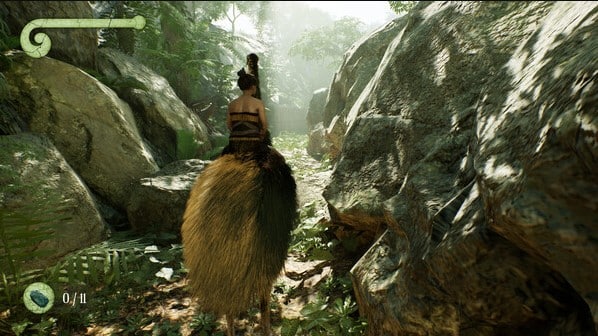Guardian Maia brought quite a unique experience to both Japanese and foreign gamers alike at Bitsummit in Kyoto last month – a respectful and authentic portrayal of Māori culture.
This upcoming PC game isn’t the first project that developer Maru Nihoniho has worked on that explores Māori culture in a post-apocalyptic world, though. Her all-Māori company, Metia Interactive, has released interactive fiction mobile apps and short animations in the same world. Still, Maru has her sights set on a much bigger release this time.
“I’ve always enjoyed playing games, from the arcade games, right through to the big PlayStation and Xbox games, and I love a story-driven game,” said Maru.
Some of the games that Maru has been influenced by in developing Guardian Maia include Tomb Raider, with all its adventure and puzzle-solving aspects; and Senua’s Sacrifice, which explored heavy experiences of psychosis, while still being fun to play.
“Parts of those games have inspired and helped me work with the story and design of what I’m doing now.”
But authentically representing Māori culture in a project as big as Guardian Maia isn’t easy.
“We’ve done it plenty of times on different platforms. Film, television, books – it’s been done. But when it comes to a game, it’s interactive and it’s immersive and the player is in control,” she said.
“How do we design the game in a way that holds all that respect but gives the player the knowledge that they need to, one, get through the game, but two, to understand the meaning of the culture? That was not an easy thing to do.”
Even after previous projects and years of consultation, it’s something that Maru continues to take seriously.
“I don’t want to be disrespectful to my own culture. I also want to ensure that someone who’s not Māori feels comfortable interacting with that culture, but also learns about our culture as well.”

Getting Guardian Maia in front of the right people
Metia Interactive received start-up funding earlier this year from the New Zealand Centre of Digital Excellence, or CODE, which aims to supercharge the country’s game development ecosystem.
Vee Pendergrast is CODE’s Industry Development Manager, and she was particularly keen to put Guardian Maia – among other New Zealand-developed games – in front of publishers at Bitsummit to take these projects to the next level.
“Games cost money to make. We can help [our developers] to a point, but it’s about finding that business deal, that distribution, that audience,” said Vee.
Read: New Zealand’s CODE is forging a new future for local game developers
CODE started as a regional economic development agency in the small city of Dunedin in New Zealand’s South Island. It went from supporting three game studios in town to 25 studios employing over 90 staff in just three years. In the last year, the agency has grown to support developers across the country including Auckland-based Metia Interactive.
“The thing about having a national agency is suddenly you have to be more places. You have to generate more opportunities. We’re looking to places like Bitsummit to help generate those opportunities for the developers that we work with.”
Bitsummit was especially a great place for smaller teams working on projects like Guardian Maia to find new audiences and business opportunities. Even with dedicated indie areas, Tokyo Game Show’s focus remains on showcasing bigger traditional AAA games to Japanese audiences. In comparison, Bitsummit is far more adept at providing networking opportunities for burgeoning developers, publishers, and media from across the globe.
San Francisco’s Game Developers Conference might still provide established game practitioners with the most valuable networking opportunities, but for now, Bitsummit is the Indie king – for Guardian Maia, for gamers, and for the folk who make them, regardless of where they call home.





